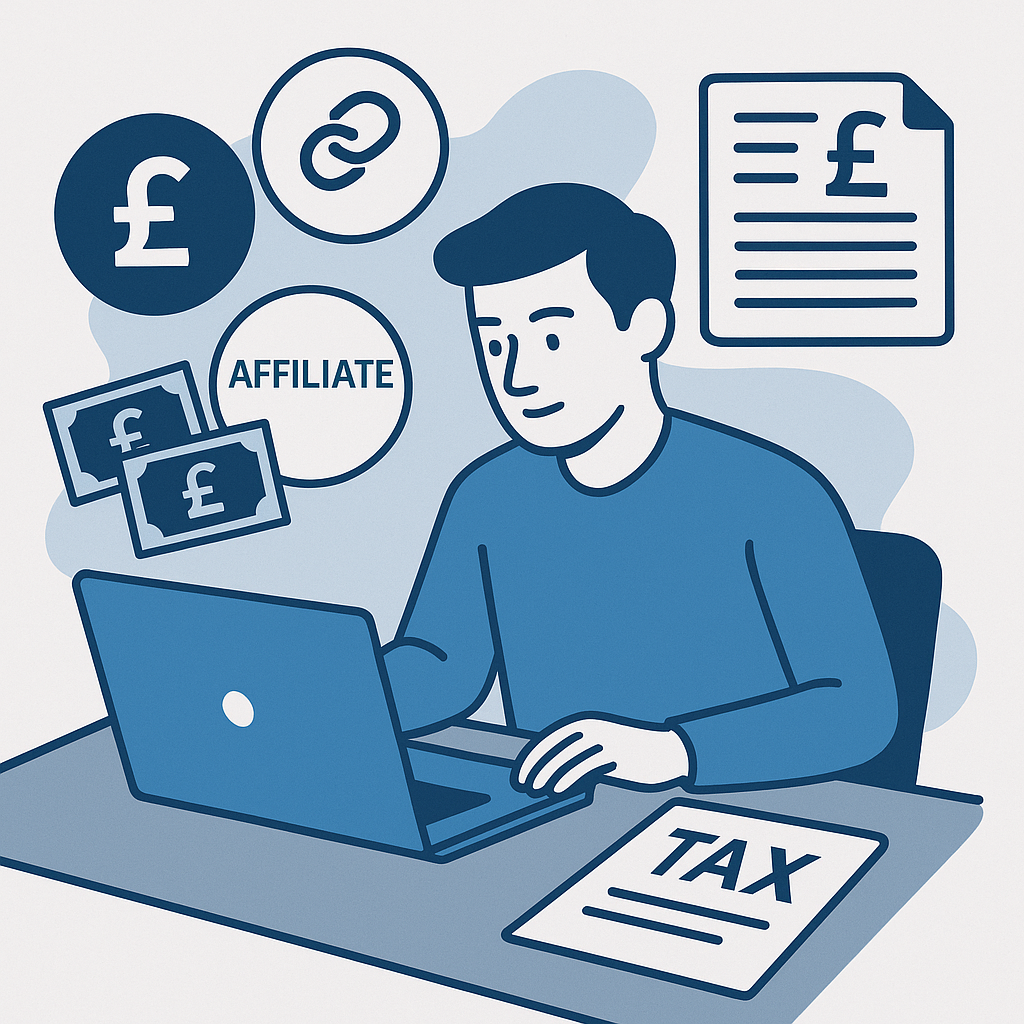Why Affiliate Marketing Income Has Tax Implications
Affiliate marketing is a legitimate commercial activity. Whether you earn commissions through a website, blog, or social media channel, HMRC views it as a business operation rather than a hobby.Once you start earning consistent income, it becomes essential to:
- Register with HMRC as self-employed
- File your annual Self Assessment tax return
- Pay any Income Tax and National Insurance owed
- Keep records of your income and related expenses
- Register for VAT if your income grows beyond the threshold
1. Registering with HMRC and Reporting Your Earnings
If you earn more than £1,000 from affiliate marketing in a tax year, you must register as self-employed. This is because you will have crossed the HMRC “trading allowance.”After registering, you will receive a Unique Taxpayer Reference (UTR) and be required to submit a Self Assessment tax return each year. On this return, you will report:
- Your affiliate income
- Your allowable business expenses
- The resulting profit on which you will be taxed
2. Paying Income Tax and National Insurance
As a self-employed individual, your affiliate income is subject to both Income Tax and National Insurance Contributions (NICs).The standard 2025 rates are as follows:
- Income Tax: You will pay 20 percent on profits up to £50,270, then higher rates beyond that amount.
- National Insurance: You will pay Class 2 and Class 4 NICs once your profits pass HMRC’s small threshold. These contributions go towards your State Pension and other benefits.
3. What Expenses You Can Claim
You are allowed to deduct legitimate business expenses from your affiliate income before paying tax. This can make a significant difference to your overall tax bill.Allowable expenses can include:
- Website hosting and domain registration fees
- Advertising and promotional costs
- Internet, software, or digital tool subscriptions
- Equipment such as laptops, cameras, or phones used for business purposes
- Professional fees (for example, accounting or design services)
- Travel and marketing-related costs
4. VAT and Affiliate Commissions
If your total taxable turnover exceeds the VAT registration threshold (£90,000 in 2025), you must register for VAT.Once registered, you may need to:
- Charge VAT on your affiliate commissions
- Submit regular VAT returns to HMRC
- Keep detailed VAT invoices and accounting records
5. Earning Affiliate Income from Abroad
Many affiliates receive commissions from foreign companies such as Amazon, TikTok, or international affiliate networks.If you are a UK resident, you must declare your global income. That means any affiliate income received from outside the United Kingdom still needs to appear on your Self Assessment return.
If foreign tax has been withheld, you may be able to claim foreign tax relief through the UK’s double taxation treaties. This prevents you from paying tax twice on the same income.
6. Common Mistakes to Avoid
Many new affiliates make the same tax mistakes, which can lead to HMRC issues later on. The most common ones include:- Treating affiliate income as a hobby or “side earnings” and not declaring it
- Forgetting to register once you pass the £1,000 trading threshold
- Not separating business and personal finances
- Ignoring VAT once turnover grows
- Poor record-keeping or lost invoices
7. Should You Set Up a Limited Company for Affiliate Marketing?
If your affiliate income grows significantly, you might benefit from forming a limited company. This allows you to pay yourself via salary and dividends, often leading to more efficient tax planning.A company structure can also:
- Protect your personal assets
- Enhance your professional image with brands and networks
- Provide clearer separation between business and personal finances
FAQs
Do I need to report affiliate income if I only earn £500?If your total income from affiliate marketing is below £1,000, you may not need to register with HMRC. However, if your income is consistent or you want to claim business expenses, registering is advisable.
Do I pay VAT on affiliate income?
Only if your annual turnover exceeds the VAT registration threshold. Some affiliates register voluntarily to reclaim VAT on their expenses.
Can I claim home office expenses?
Yes, if part of your home is used exclusively for affiliate work, you can claim a portion of household expenses such as utilities or rent.
What if my commissions come from abroad?
You still must declare this income on your UK tax return. Double taxation relief may apply if you have already paid foreign tax.
Conclusion
Affiliate marketing is an accessible and rewarding way to earn income online — but it is not exempt from UK tax laws. Once your earnings grow beyond £1,000 per year, HMRC considers you self-employed, and you must declare your income and pay tax accordingly.At Persona Finance, we specialise in supporting digital creators, influencers, and affiliate marketers. Our accountants ensure you stay compliant with HMRC while maximising your tax efficiency.
👉 Book a consultation today to discuss your affiliate tax setup and avoid unnecessary stress during Self Assessment season.



